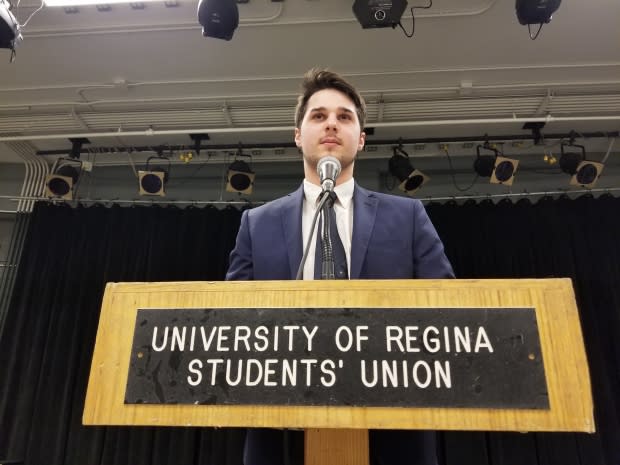U of R Students' Union calling for more negotiations to prevent faculty strike
First-year arts student Shae Sackman said a possible strike at the University of Regina is "a lot to deal with," especially if finals get postponed and summer classes are affected.
"I don't know what's going to happen to me," she said.
The U of R and its faculty association have not been able to reach an agreement after mediation, and the faculty association says it's not ruling out the possibility of job action.
"I don't know if I have a way to pay my rent. I don't know if I'll have a way to get around the city to go to my doctors' appointments and stuff like that, just because everything is so intricately tied together for me personally."
Shawn Wiskar, president of the University of Regina Students' Union (URSU), said Sackman is one of many students at the U of R campus concerned about a possible strike or lockout.
A strike or lockout could begin on March 28, which would disrupt the last few weeks of the semester for more than 15,000 students.

"There is a growing anxiety across our campus from students," said Wiskar.
"We're hearing more and more every day through various channels of social media, in-person and kind of just through the grapevine that students don't know what's going to happen and they're getting very concerned."
As a response to the possible strike or lockout, URSU is calling on both parties to return to the bargaining table to find a solution.
They are also asking both sides to commit to taking no job action in the 2019 winter semester.
Students caught in the middle
Wiskar said students would bear the brunt of any strike.
"We felt it was both necessary and important that we stand up and we say that this strike is going to have real impacts on students and it absolutely is something that will be damaging to students," he said.
Students who are graduating this year would likely be affected the most.
"Those students won't be able to actually successfully collect their diploma or their degree until after a strike," said Wiskar.
"That could mean a delay in exams. Those that have accepted jobs that are conditional upon them getting a degree, that could mean that they actually have to push back taking that job."
It would also impact students who plan to work during the summer, including international students.
"The day the exams start getting postponed is the day when they start getting really affected," said Anwit Adhikari, a third-year physics major from Nepal.
"If students have put in that much effort into a system, they have a right to expect a fair deal out of it," he said. "The students had no rule in this and if they have paid their fair share they should not get the short end of the stick."
Adhikari said he is also concerned about the "exorbitant amount of fees" international students pay to attend the U of R.
Tuition fees
Rising tuition fees for domestic and international students are a concern for URSU as well.
"There needs to be more conversation about the continual increase of all employee salaries, including those out of scope, diversifying university income and effective budget management so that costs are not directly off-loaded onto students," said Wiskar.
He said a strike or lockout could harm the university's international and domestic reputation.
The collective agreement expired in June of 2017 and negotiations on it have been happening since April 2018. The agreement covers faculty, instructors, laboratory instructors, librarians and sessional lecturers.
The faculty association said the university has failed to address its core issues, which include pension contributions, compensation that matches the rate of inflation and hiring "sufficient" permanent teaching staff.
Meanwhile, U of R provost and vice-president academic Thomas Chase told CBC News on Friday that when it comes to negotiations, the university is concerned about mitigating tuition and fee increases.
Negtiations are set to continue on March 25 and 26.

